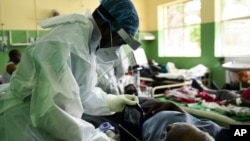Malawi will reopen schools on Monday (Feb 22), five weeks after President Lazarus Chakwera suspended classes due to a surge in COVID-19 cases. Malawi's Presidential Task-Force on COVID-19 determined it is safe to resume classes after a drop in the rate of infection.
Co-Chairperson of the Presidential Task-Force on COVID-19 Khumbize Kandodo Chiponda said in a televised address Wednesday night the infection rate is at 16%, down from 30% in January, when classes were suspended.
She said, “Actually what we wanted is that once we reopen the schools our children should be safe because we know that when we were closing the schools, some teachers were COVID-19 positive and were on quarantine. So we wanted to give them enough time to recover.”
However, Kandodo Chiponda, who is also minister of health, said some schools will require students to produce COVID-19-negative certificates to be allowed into class.
She asked parents to comply with such a requirement, saying the government has enough COVID-19 test kits in all public hospitals in the country.
She said, “I would like to ask schools with such a requirement not to suspend learners with positive COVID-19 results but reverse their places and give them enough time to recover.”
Critics say the decision to resume classes has been rushed and many schools, especially in rural areas, are not ready to reopen.
They say unmet requirements include on-the-campus water sources for hand washing and enough classrooms for proper social distancing when learning.
But Education Minister Agness Nyalonje says everything is set and that the ministry has allocated about $6 milion for the reopening of schools.
Nyalonje said part of the money will be used to drill 400 boreholes in primary schools and 240 in secondary schools to improve sanitation.
“My ministry has made money [available] directly to schools through zonal accounts for them to procure soaps, to procure masks, to procure buckets where buckets need replacing, to make sure that when schools open, these things are in place,” she said.
She said the challenge is to find tents for additional classrooms in highly congested schools.
“Because it so happens that globally, the scramble for tents is very, very high but we are very advanced to get tents and we are hopeful that we will find tents and probably within a week,” said Nyalonje.
Nyalonje also said the government has recruited 2,275 auxiliary teachers to ease pressure on permanent teachers.




